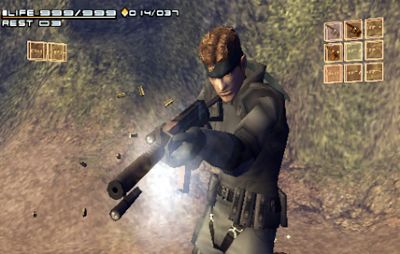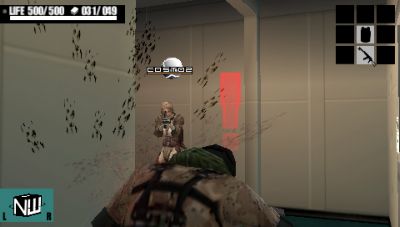 You don't need to have experience with card-based games to really grasp the concept. Every
thing you do, from walking, to shooting, to sneaking up on guards is done via a card
system. It's not very deep from the start, easing players into the game with the first few
levels, building on a slow tutorial. You learn everything you need before jumping in to
the next section. There comes a point where you'll be joined by an ally who brings with
them an entirely new deck to play with. You can tweak all of this until you've found the
deck that suits your style or let the computer set it up for you.
You don't need to have experience with card-based games to really grasp the concept. Every
thing you do, from walking, to shooting, to sneaking up on guards is done via a card
system. It's not very deep from the start, easing players into the game with the first few
levels, building on a slow tutorial. You learn everything you need before jumping in to
the next section. There comes a point where you'll be joined by an ally who brings with
them an entirely new deck to play with. You can tweak all of this until you've found the
deck that suits your style or let the computer set it up for you. The mechanics of it all work out, in the end, better than you would think. Each card of course has an assigned value, a specific power, and a way it should be used. Weapons can be equipped or used and dropped. The greatness of it all comes from the flexibility. You can play this just as you have the other games in the Solid series. If killing everyone in a section is how you handle these games, go for it. If you prefer to sneak around, go ahead. You're obviously graded higher and earn more points (used to buy more cards) if you use stealth, but the game can still be completed as a near suicide mission. It's more flexible than is expected from a card game.
Everything is broken down into smaller sections, perfect for portability and level design. There are times when it seems you need to backtrack too often, so make sure the area behind you is secure at all times. Elevation in the levels also plays a role. If you're on a lower level than an enemy and spotted, they have the opportunity to do more damage. Have your back turned and to be on a lower level is almost certain death. It makes sure you're contemplating every move you make, what direction you're facing, and where you can go next.
 This system is far from perfect, a times becoming more infuriating than fun. The
randomness of the card draw is expected, but it's hard to plan when you're unsure of
what's going to come up next. There are times when you'll be spotted with no way to defend
yourself and no way out. That never seems to be fair. It's all very slow paced as well,
lethargically moving forward at a clip not suited for a handheld. You can speed up the
opponents turn, but not your own. Some of the animation routines seem to take forever.
This system is far from perfect, a times becoming more infuriating than fun. The
randomness of the card draw is expected, but it's hard to plan when you're unsure of
what's going to come up next. There are times when you'll be spotted with no way to defend
yourself and no way out. That never seems to be fair. It's all very slow paced as well,
lethargically moving forward at a clip not suited for a handheld. You can speed up the
opponents turn, but not your own. Some of the animation routines seem to take forever. The same set of completely off base characters this series has become known for are all here, including a pair of psychotic dolls that manage to slaughter everyone they come in contact with, all with a school girl glee. It's eerie, disturbing, and Metal Gear Solid all the way through. The story around them (and around the entire the game) does fall into a trap where it seems impossible to follow at times. Everything is done via text; there's no voice acting here from Snake's voice David Hayter anywhere in the game.
You can still figure out that it's Snake with or without the voice acting. The model used here looks to be an upgraded version of the one used in the original Solid on the PS One. The textures are clean and facial detail is strong. The animation seems strangely stiff, and that goes for everyone else. Environments are clean and are spattered with an occasional detail, including much needed foliage. Explosions are amazing, especially the particle effect. Accompanying the text-based storyline are still pictures, done in an anime style. It doesn't particularly fit the series, but it's necessary to get the story across.
 Bit and pieces of the classic Metal Gear Solid soundtrack are included, mostly
when playing a special card accompanied by a video clip of the specific game in the series
(almost all the cards are based on a specific game). Getting through a section of the game
can take a while, so the occasionally repetitive music actually in the game is annoying.
Sound effects remain sparse, reserving themselves for any action.
Bit and pieces of the classic Metal Gear Solid soundtrack are included, mostly
when playing a special card accompanied by a video clip of the specific game in the series
(almost all the cards are based on a specific game). Getting through a section of the game
can take a while, so the occasionally repetitive music actually in the game is annoying.
Sound effects remain sparse, reserving themselves for any action. For being such a radical departure, attempting to try something innovative, and still coming through with an enjoyable gameplay experience, Ac!d is commendable. It depends on patience to really get started. It's not a game you can try for 20-minutes and decide you don't like it. It requires time to develop and once it does, you'll feel happy to spend about 15 hours of your life on it.